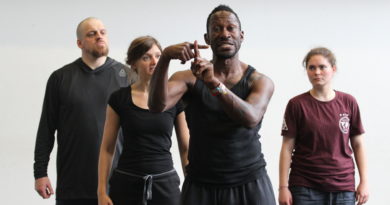Rites at Tobacco Factory Theatres
Normally when I am writing a review, I think where I am going to begin. Shall I start by discussing the staging? Whether the actors immediately drew me in? The atmosphere in the auditorium? After Rites at Tobacco Factory Theatres last night, little of this mattered. I was left reeling at how powerful theatre can be as a tool for education and change.
Rites is a play that deals with the subject of Female Genital Mutilation, or FGM for short. FGM is a cultural practice where girls go through the partial or total removal of a their external genitals. Historically, this was done with no anesthetic, and the most extreme cases, the genitals are sewn shut leaving just a small hole for urine and menstrual blood to be expelled. The body is physically damaged when the healthy tissue of the genitals are cut away, and the reasons for the cutting being performed are complex and varied. I found this website incredibly useful for learning more about the subject.
The play is based on interviews with real people who have been affected by FGM. Central to the story is Fara, a young woman from Gambia who has come to study and live in Scotland. During a lecture on gender violence, she realises she is the victim of FGM, and her story and those of other women unfold in the hour and a half performance.
FGM is a complex subject, and all the layers and arguments for and against it are explored in a sensitive yet emotive way. At no point does the piece deny that real change needs to happen, but it makes the argument for change in a subtle, intelligent way, recognising that solutions are not as straight forward as you may believe. The play was incredibly clever, as nobody was demonised for his or her individual choices around FGM. Often, the practice of FGM is supported and held in place by an entire community. It can be hard for a lone voice that may not want their daughter cut to act alone, to go against their community and culture. If you question an accepted part of the culture, you risk sanctions from that community. Being ostracised. Your precious daughters you are trying to project may be seen as ‘worthless’ or ‘unclean’ if they do not get cut. Members of your community may take your daughter away anyway and get her cut so you do not bring shame on yourself and your family. No, the subject of FGM is not as straightforward as just vilifying those who get it done to themselves or their daughters, it is so much more complicated than that.
I was left in tears at many points throughout the show. It was like a knife to my heart thinking about the girls as young as five having this done to them, often without pain relief and with a huge risk of infection. I am the mother of a 5 year old girl. The tears flowed. But a really key moment for me was when I was asked to examine my own culture. The plastic surgery procedure of getting a ‘designer vagina’ is massively on the increase, especially in young women. Only decades ago, gynecologists in the UK attempted to ‘cure’ lesbians by sexual surgery, the removal of the clitoris. How could I say that this practice has nothing to do with me, when faced with such facts?
I was forced to question all of the assumptions I held about the practice of FGM. And I was ashamed to say it is a subject I was aware of, but never found out more about. I didn’t want to know, couldn’t get my head round it. And felt that it didn’t affect me, so I needn’t pay it much mind. I left The Tobacco Factory realising that these conversations should not just be between women from these communities, or be kept hidden. If change is going to happen, if cultures and communities are going to move away from an accepted social norm to a place where FGM is rejected, then the work needing to be done is multi layered and complex, much like this play. Taboos and conventions need to be tackled at community levels. Difficult conversations will need to be had. Collective decisions need to be made to abandon the practice. At the heart of all of this is understanding the multitude of reasons why this practice continues, and educating as to why FGM needs to stop.
I knew this play would be hard hitting, thought provoking and challenging. What I wasn’t expecting was to leave the theatre with a feeling of optimism. FGM is ending, but it is a long road with much work to do. But hearing the voices of these strong women and men who are pushing for change and educating themselves and their communities filled me with hope. Hearing women who had forcibly been cut forgive their mothers for their part in this and describe their loving relationships with them was emotional. A shift is happening, and I will no longer be that woman who believes it has nothing to do with me and I need pay this practice no mind. This is not part of my culture, but there are parts of my culture that WILL impact on my daughters, their sexuality and their understanding and acceptance of their bodies. Whatever culture we are part of, we all have a responsibility to have difficult conversations, challenge outdated or harmful social norms and move towards an acceptance of the beauty of our bodies. Exactly as they are. For the sake of our girls AND our boys.
Rites is part of Mayfest, and is on at Tobacco Factory Theatres until Saturday 23rd May.



